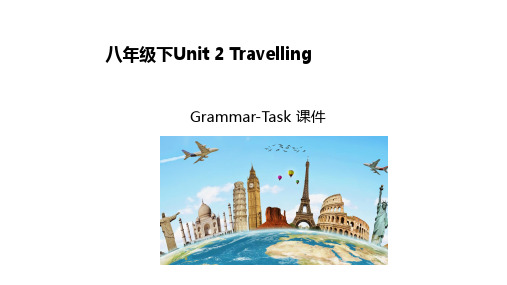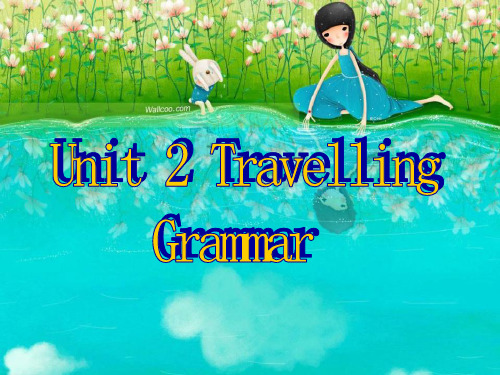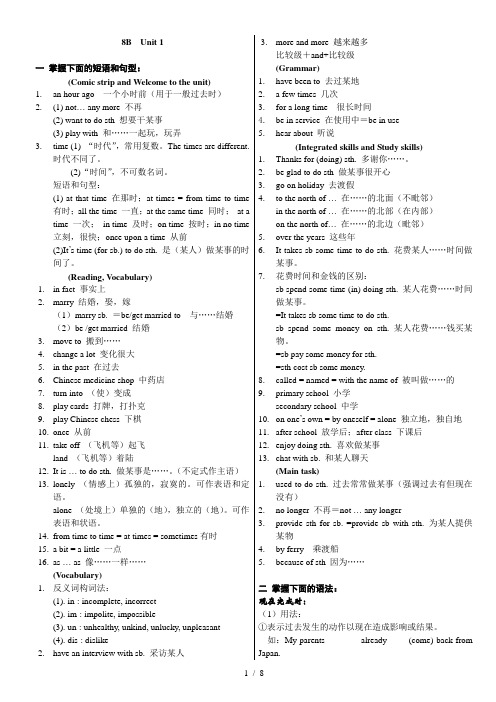八年级英语下学期8b-unit2-grammar牛津英语
- 格式:pdf
- 大小:1.25 MB
- 文档页数:8



Unit 2 Travelling一、教学内容:Unit 2 TravellingGrammar二、教学目标:掌握Unit2的词法结构和用法:1. so…that /such…that/enough to/too…to…2. have/has been in, have/has been to, have/has gone to3. 延续性与短暂性动词经典讲解Grammar 1:so…that /such…that/enough to/too…to…解释:如此……以至于……so+ adj. /adv. +that从句或such+单/复数名词+that从句例:It’s so hot in summer that we can’t do without the air conditioner.夏天的天气热的我们少不了空调。
The teacher spoke so fast that I couldn’t understand what he was saying.老师讲得太快以致于我听不懂他在说什么。
He is such a genius that he doesn’t have to study much for exams.他是个天才,所以他考试都不用怎么念书。
They are such good basketball players that everybody wants to watch their games.他们个个都是很棒的篮球员,所以每个人都想去看他们打球。
表示:足以做某事enough to… 如: He is old enough to do it.意思是太……而不能too...to… 例: He is too young to go to school.中考so…that, too…to和enough to都是初中英语教材中的重要结构,在一定条件下它们可以相互转换,并经常成为中考考查的热点之一。

《学英语随堂反馈》提高卷Test for Unit 2 of 8BClass Name一、单项填空(15%)( ) 1. If you go by train, you can have quite _______ comfortable journey, but make sure you take _______ fast one.A. a; aB. the; aC. the; theD. /; a( ) 2. How _______ it is to watch the new film!A. excitementB. excitedC. excitingD. excitedly( ) 3.—Do you know him well?—Sure. We ________ friends since ten years ago.A. wereB. have becomeC. have beenD. have made( ) 4. —How _______ is it from Beijing to Shanghai?—It’s about two _______ flight.A. far; hour’sB. long; hour’sC. long; hours’D. far; hours’( ) 5. The factory has _______ since last October.A. openedB. been closedC. been openedD. closed( ) 6. —Nice to see you. I _______ you for a long time.—I _______ Beijing. I’ve just come back.A. didn’t see; wasB. haven’t seen; have been inC. haven’t seen; have been toD. didn’t see; have arrived( ) 7. —I haven’t heard from Henry for a long time.—What do you think _______?A. he has happenedB. to happenC. has happened to himD. him to happen( ) 8.—How long ________ you _______ the bad cold? —Since last week.A. do; catchB. have; hadC. have; caughtD. did; catch( ) 9. —Could you tell us how long he has _______?—For about two hours.A. gone to sleepB. fell asleepC. fallen asleepD. been asleep( ) 10. He has _______ to Tibet many times. This time he _______ Tibet for two weeks.A. been; has been inB. been; has gone toC. gone; has gone toD. gone; has been in ( ) 11. —Why not stop _______ a rest?—Oh, it’s so exciting that I can’t stop _______ the kite.A. having; flyingB. to have; to flyC. having; to flyD. to have; flying( ) 12. She _______ for 15 years, yet she still doesn’t know what kind of man she _______.A. has been married; has married withB. has got married; married toC. has been married; marriedD. has married; has married to( ) 13.—How long has the foreigner (外国人) _______ here?—He came here ten minutes ago.A. beenB. comeC. arrivedD. got( ) 14. The man _______ Shanghai an hour ago, so he _______ for an hour.A. was away for; has leftB. left; has leftC. left for; has been awayD. has left for; has been away( ) 15. —We can give you a ride into town.—_______ Thank you.A. Yes, why not?B. Oh, it would be my pleasure.C. Yes, please.D. Oh, that would be great.二、完形填空(10%)It was the end-of-year party. I had asked my mother to 1 the cakes. Mom’s chocolate cakes were the best.I stood by the window 2 for her. Two o’clock passed, but there was no 3 of her. Most of the other mothers had come and gone, 4 off their cakes and chips. The party went on, but I couldn’t 5the window. The three o’clock bell soon took me away from my 6 . I took my bag and walked out for home.There was no person when I arrived. My heart (心) was full of anger. For the 7 time in my life, my mother had let me down (使……失望). I was lying on my bed when I heard her coming in.“Robbie,” she called out. “Where are you?” She was looking for me from room to room, but I kept 8 .When she entered my room, I didn’t move. “I am so 9 ,” she said, “I got busy and forgot.” She began to laugh. I couldn’t believe it. I 10 and found she was not laughing but crying. She cried like a little girl. I had never seen my mother cry.“It is OK, Mom,” I said. “We didn’t need those cakes. There was enough food to eat. Don’t cry. It is all right.” We held each other in a long hug (拥抱).( ) 1. A. make B. buy C. bring D. show( ) 2. A. looking B. waiting C. caring D. asking( ) 3 A. news B. message C. sign D. food( ) 4. A. falling B. taking C. cooking D. dropping( ) 5. A. clean B. open C. leave D. see( ) 6. A. dreams B. words C. thoughts D. places( ) 7. A. last B. no C. each D. first( ) 8. A. crazy B. silent C. calm D. awake( ) 9. A. sorry B. worried C. glad D. late( ) 10. A. turned up B. turned away C. turned over D. turned off三、阅读理解(20%)(A)Bob always took the newspaper to Grandpa White’s home before going home. Grandpa White’s was at the end of the road. Bob liked Grandpa White. He was often waiting for him near the front gate with sweets or a nice cake. Besides, he often asked Bob about things he was doing, what he was going to do for the summer and what he liked to do.The thing that Bob didn’t like about Grandpa was his never-ending stories about his boyhood(童年)in California. Bob was ne ver asked to hear about Grandpa’s boyhood, but he couldn’t get away.After Grandpa’s wife died in October, Bob could see that Grandpa was lonelier than ever. He would often join Bob halfway along the road and walk along with him as he gave out the newspapers. Grandpa seemed to have all day, and Bob was often late giving newspapers to his customers(订报者). Bob didn’t want to complain, but the customers were unhappy.( ) 1. When he took the newspaper to Grandpa White, Bob would often receive _______.A. sweets or a cakeB. old newspaperC. some moneyD. stories( ) 2. Which do you think is true?A. Bob lived with Grandpa.B. Grandpa had many stories about his boyhood.C. Grandpa didn’t like to read newspapers.D. Bob took the newspaper to Grandpa first.( ) 3. Bob could do nothing when _______.A. the customers got their newspapers lateB. Grandpa began to tell him about his boyhoodC. he saw grandpa feeling lonelyD. Grandpa asked him about the things he was doing ( ) 4. The passage mainly tells us that _______.A. Bob was still a childB. Grandpa liked to tell storiesC. the customers sometimes got angryD. lonely people need other people( ) 5. The underlined sentence means Grandpa _______.A. always seemed to like daytimeB. liked telling stories to Bob all dayC. like to stay with Bob all the timeD. seemed to be lonely all day(B)Height is just one of the thousands of features that your genes (基因) decide. In fact, because you have two parents, your genes provide you a height that usually lands somewhere between the height of each parent. If both your parents are tall, then maybe you will be tall, too, but if you have questions about how tall you’re going to be, ask your doctor if he or she can help you find it out.But genes don’t decide everything. For example, eating an unhealthy diet can keep you from growing to your full potential (潜力). Getting enough sleep and enough exercise will help you grow to the right height.Maybe you’re wondering how fast you should grow. There’s no right answer. Kids grow about 2 inches (5 centimeters) a year between age 3 and the time they start puberty .Your doctor will know how your growth (生长) has been going over the years. Two centimeters here and 2 inches there are not nearly as important as the height you’re at now, how you’ve been growing up to this point, and what other changes your body may be going through.Don’t be worried if you have grown a lot in a very short time. Everyone has a very quick growth during puberty. The age for starting puberty is about 10 for girls and about 11 for boys. But it can be earlier or later—between 7 and 13 for girls, 9 and 15 for boys.You’ll usually begin to find that you’re growing faster about a year after your body starts to show the first changes of puberty.( ) 6. The Chinese for the underlined word in the third paragraph “puberty” is _______.A. 童年时期B. 婴幼儿时期C. 习惯养成期D. 青春期( ) 7. If you want to know how fast and how tall you should grow, _______.A. you should have enough exerciseB. you can ask doctors for helpC. you should protect the environmentD. you can record your growth during puberty( ) 8. This passage is mainly about _______.A. how the genes work in your bodyB. when the time you grow fast isC. why you look like your parentsD. how you grow to a certain (某一) height( ) 9. After reading this passage, we can explain (解释) _______.A. how good it is to be a doctorB. how much sleep we needC. why genes can’t decide everythingD. what an unhealthy diet is( ) 10. Which is NOT mentioned (提及) in the passage?A. Your height most probably depends on (取决于) how tall your parents are.B. Girls usually start puberty earlier than boys.C. You never see the time showing the first changes of puberty.D. You may be worried sometimes when you grow too fast.四、词形变化(5%)1. My elder brother loves activities on the sea, such as _______________ (sail).2. His little cat has been ______________ (die) for almost three days.3. Now, _______________ (travel) has become popular among young people.4. Many people enjoy visiting places of _______________ (nature) beauty.5. Each of us got _______________ (excite) about the funny show.五、根据句意和汉语注释,写出单词的正确形式(10%)1. She suddenly appeared (出现) as if by ________________ (魔法).2. There are more and more ________________ (海鲜) restaurants in Wuxi.3. Yao Ming’s performance is very ________________ (极棒的) in the match.4. I always _______________ (想念) my parents after I left hometown to live in the school.5. Let’s meet our friends at the _______________ (机场) this afternoon, shall we?6. When the accident happened, the car was travelling at a _______________ (速度) of 120 miles an hour.7. The workers in this factory have to work every day _______________ (除了) some important festivals.8. People in the city would like to live in the _______________ (农村) because the air is much fresher there.9. By the time I arrived there, the show was _______________ (结束).10. I’ve never see _______________ (这样的) an interesting film before.六、动词填空(10%)1. —Mary with her parents ___________ (go) to Hong Kong already. —Really? When will they be back?2. The book ____________ (include) five parts. But the third part is my favourite.3. We ____________ (visit) many Chinese gardens during the past three years.4. When I was chatting online, I heard someone ___________ (knock) at the windows.5. —Where are your parents?—They ___________ (fly) to Tibet for a holiday already.6. It is the second time I _______________ (see) this 4-D film.7. —I hear Jane has gone to the Holy Island for her holiday.—Oh, how nice! Do you know when she _______________ (start)?8. We can never catch up with the fashion because it ____________ (change) all the time.9. The pen I bought yesterday ____________ (not write) well.10. —When did you receive her letter?—I ____________ (have) it for three days.七、任务型阅读(10%)Not only adults but also teenagers have problems in their life. Here is a survey (调查) showing the main problems of teenagers.They feel stressed (有压力的) because they have too much homework to do both at school and at home. They have lots of exams to take. And parents usually send them to different classes at weekends. They don’t have their own time to do what they are interested in. Now more and more teenagers are getting short-sighted (近视). They often read in bed or keep reading for a long time without having a rest. Some of them are crazy about playing computer games. Some spend too much time watching TV. Another problem among teenagers is that many of them are becoming fat. They eat too much junk food, but they take little exercise.I think teenagers should think of ways to deal with (处理) these problems. They should make a plan for study and hobbies and find time to relax (放松) as much as possible.八、完成句子(10%)1. 爸爸工作很忙,他已经一个星期没有回家了。

8B Unit 2 Travelling Grammar(2)班级姓名备课组长【教学目标】1.进一步学习现在完成时2.学习has been to /has gone to/ has been in在现在完成时中的应用。
【课前预习】一.用have(has) been 或have(has) gone 填空。
A: Where ____________ Li Fei ___________?B: He ____________ to Hainan Island.A: How long ___________ he ___________ there?B: He _____________ there for three days.A: When will he come back , do you know?B: I’m afraid he won’t come back recently.A: Could you tell me the way to Hainan Island?B: Sorry, I _________ never ___________ there.A: How many times ___________ Li Fei ______ ____ to that place?B: He _____________ there only once.二.用have/has been to/in, have gone to的各种形式填空。
1) Where is Jack? He _____ _____ hi s coun try.2) John ____ _________ England since he came back.3) How long _______ you ___ ____ this village?4) The Smiths _____ _____ Beijing.They’ll be back tomorrow.5) _______ you ever _________ America? -- Yes, I __ ______ there many times.6) I ____ ______ this school since three years ago.【教学过程】1Revision1.Ask : Kitty has travelled to Hong Kong Diseyland. Have you ever been toDiseyland?2.Present “ have gone”. Ask a boy to go to the teachers’ office.Then ask the others: Is he in the classroom now? Where has he gone? He has gone to the teachers’ office.3.Try to differ “ have been” and “ have gone”.4.“ have been”表示:去过某个地方并且已经回来了“ have gone”.表示:去了某个地方但已尚未回来5.Explains:延续性动词与for /since引导一段时间连用,表示从过去某一时间开始并一直延续到现在的情况,用现在完成时。






★思维导图★语法:动名词1 动名词的基本形式:动词原形+ing;否定式:not +动词原形+ing。
动名词是由“动词原形+ing”构成,它在句中可作多种成分。
变化规则1)一般在词尾加ing。
buy-buying wait-waiting rain-raining2)以不发音的e结尾的动词,去掉e再加ing。
use-using ride-riding3)以重读闭音节结尾,双写最后一个辅音字母再加ing。
begin-beginning cut-cutting4)少数以ie结尾的动词,变ie为y,再加ing。
die-dying lie-lying tie-tying5)以oe, ee, ye结尾的动词,直接在词尾加ing。
see-seeing flee-fleeing2 动名词在句中的作用:(1)作主语。
如:Seeing is believing. 眼见为实。
注意:动名词作主语时,谓语动词用单数形式。
(2)作表语。
如:Her Job is teaching English. 她的工作是教英语。
(3)作宾语。
如:I like travelling very much. 我很喜欢旅游。
(4)作定语。
如:This is our reading room. 这是我们的阅览室。
3 习惯接动名词作宾语的动词有:enjoy, finish, imagine, keep, mind, practise等。
如:My sister enjoys playing tennis. 我姐姐喜欢打网球。
Do you mind opening the window? 你介意开窗吗?4 动名词也可以在短语动词和介词后作宾语,习惯接动名词作宾语的短语有:be afraid of, be busy, be good at, be interested in, be worth, feel like, how / what about, look forward to, pay attention to, succeed in, think of等。

8B Unit 1一掌握下面的短语和句型:(Comic strip and Welcome to the unit)1.an hour ago 一个小时前(用于一般过去时)2.(1) not… any more 不再(2) want to do sth 想要干某事(3) play with 和……一起玩,玩弄3.time (1) “时代”,常用复数。
The times are different.时代不同了。
(2)“时间”,不可数名词。
短语和句型:(1) at that time 在那时;at times = from time to time有时;all the time 一直;at the same time 同时;at a time 一次;in time 及时;on time 按时;in no time 立刻,很快;once upon a time 从前(2)It’s time (for sb.) to do sth. 是(某人)做某事的时间了。
(Reading, Vocabulary)1.in fact 事实上2.marry 结婚,娶,嫁(1)marry sb. =be/get married to与……结婚(2)be /get married 结婚3.move to 搬到……4.change a lot 变化很大5.in the past 在过去6.Chinese medicine shop 中药店7.turn into (使)变成8.play cards 打牌,打扑克9.play Chinese chess 下棋10.once 从前11.take off (飞机等)起飞land (飞机等)着陆12.It is … to do sth. 做某事是……。
(不定式作主语)13.lonely (情感上)孤独的,寂寞的。
可作表语和定语。
alone (处境上)单独的(地),独立的(地)。
可作表语和状语。


译林8B英语UNIT 2单元知识点归纳及练习题8B Unit 2一、词汇句型大汇总1. 去某地度假go to sp for a holiday在度假be on holiday2. 我以前去过那。
I have been there before.你曾经去过北京吗?Have you ever been to Beijing?去过某地(已经回来)have been to sp去了某地(还没回来)have gone to sp3. 加入某人去做某事join sb in doing sth4我正在收拾东西。
I am gett ing all my things.5来自某人写的一个故事come from a story by sb6这本书有什么特别的?What’s special about this book?7. 我是如此想念你。
I miss you so much.8. 我来香港已经两个月了。
I have been in Hongkong for two months.9. 玩得特开心have a fantastic time10. 花了一整天spend the whole day11. 一个室内过山车an indoor roller coaster12. 高速运行move at high speed以……的速度at the speed of加速speed-speeded/ sped- speeded/ sped13. 全程都在尖叫大笑scream and laugh through the ride14. 匆忙去餐馆吃了份快餐hurry to a restaurant to have a quick meal15. 匆忙去某地hurry to sp (动词)/ go to sp in a hurry(名词)匆忙做某事hurry to do sth16. 见到一些迪士尼卡通人物meet some Disney cartoon characters17. 比方说such as18. 迪士尼人物的游行 a parade of Disney characters19. 跟在他们后面跑run after them20. 忍不住拍照can’t stop taking photos忍不住做某事can’t stop doing sth21. 看了一场4D电影watch a 4-D film22. 就像是魔术be like magic (名词)23. 闻到苹果馅饼的味道smell the apple pie24. 给某人买了几个钥匙扣buy a couple of key rings for sb25. 这天快要结束的时候at the end of the day26. 看烟花watch the fireworks27. 在烟花下看上去闪亮又漂亮look bright and beautiful under the fireworks28. 在你待在那期间during your stay there (名词)29. 待在家stay at home (动词)30. 这个是送给你的。

Period 1:Welcome to the unit一、教学目标:1.了解外国城市著名的旅游胜地和受欢迎的景点。
2.熟悉人们在不同景点从事的各种活动。
二、教学重点:熟悉外国城市著名景点并会运用一些描写旅游的词汇。
三、教学准备:录音机,多媒体,投影仪四、教学设计:Step 1 Lead– inDiscussion:1. Each country has it’s places of interest. Let the Ss tell places of interest in foreign countries and write some of them on the Bb.2. Ask them what people can do if they are in the famous places.Step 2 Presentation1.Show the pictures of the places of interest. Teach the new words and pronunciation.2.Lead them to read the names of places and countries. Do the exercise: match the places of interest and the countries.Step 3 Group work1.show the picture of Mount Fuji.2.Make dialogues. Show the picture of Mount Fuji.T: What’s this?Ss: It’s Mount Fuji in Japan.T: What can people do there?S1: They can climb hills/ take photos.Make dialogue about other five pictures in pairs. Practice the dialogue before the whole class.After reading the new words fluently, let Ss match the parts with lines on their book.Step 4 comic strip1. T: Today Eddie is going on a trip. Listen to the tape and answer the questions:Where is Eddie going?Is he happy at first?Does Hobo want to go too?How does he feel?Is Eddie happy at last? Why or why not?2. Show Picture 4. Show the difference between P2 and P4. Try to get their two’s thoughts. Present the dialogue between them.3. Read the dialogue after the tape.Practice the dialogue in pairs.Act out.Step 5 Homework1. Recite the dialogue of comic strip.2. Do some exercises.Period 2: Reading(1)一、教学目标:1. 了解Kitty一家的香港之行,通过课文让学生了解有关迪士尼乐园的情况。


